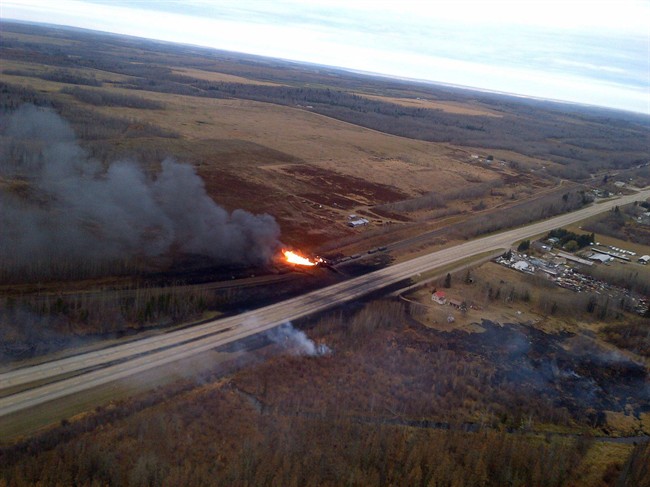EDMONTON – An Alberta woman forced from her home by a fiery explosion of train cars following a derailment hopes a report will lead to better rail industry safety.

On Tuesday, the Transportation Safety Board is to release the findings of its investigation into what caused 13 Canadian National Railway freight cars carrying propane and oil to derail near Gainford, Alta., west of Edmonton in October 2013.
Although no one was hurt, the flames from the derailment forced more than 120 people to evacuate the hamlet for four days.
Jeanette Hall still remembers being woken up by an explosion and fleeing the property with her husband, two horses and the family dog.
“I heard the train derail and then suddenly there was that large boom. Watching the curtains melt in front of me was absolutely horrific.”
Hall said she hopes the report will spell out why the derailment happened, what caused the explosion and how future accidents can be prevented.
The safety board has said the westbound CN train with 134 cars, including some with dangerous goods, experienced an “undesired emergency brake application” in the Gainford area.

Nine of the derailed cars were carrying liquefied petroleum gas and four were carrying crude oil.
READ MORE: Crude awakening: a Global News series on oil
Parkland County Mayor Rod Shaigec said he hopes the report leads to stronger requirements for rail line inspections, including more oversight by the Transportation Safety Board.
He also wants regulations that would require the major railways to separate rail cars that carry dangerous goods to minimize the danger to people when there are derailments.
Shaigec said it was fortunate that nobody died in Gainford.
“I am looking forward to seeing the … recommendations that come forward and I’m hoping all of the recommendations are implemented, and that CN and CP don’t utilize the excuse that it is too expensive to implement,” he said. “Loss of life should not be trumped by a corporation’s bottom line.”
On Friday, the federal government announced it will bolster rail safety inspections, demand higher insurance liability from small carriers and create a disaster relief fund paid for by oil producers.
READ MORE: What happens when you ask Transport Canada about rail safety reforms
The measures are in response to a July 2013 explosion and fire in Lac-Megantic, Que., where a crude-laden train derailed, killing 47 people and incinerating the downtown core.
Hall and her family have since moved from Gainford to a nearby community that is further away from the train tracks.
She said she and her horses are still spooked by the sound of freight trains.
“I couldn’t sleep for a good seven or eight months, because every time I would fall asleep, I would see the explosion again,” she said.
“It still haunts me. I still cannot sit in from of a train crossing while a train is going by without feeling very anxious.”



Comments